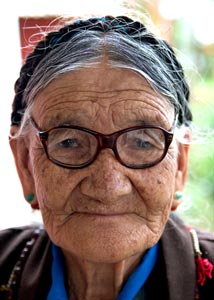Name: Chonzom
(Alias: No)
Gender: Female
Interview Age: 79
Date of Birth: 1928
Birthplace: Seralung, Utsang, Tibet
Year Left Tibet: 1967
Profession: Nun
Monk/Nun: Previously
Political Prisoner: Yes

Interview No.: 5
Date: 2007-06-29
Language: Tibetan
Location: Lugsung Samdupling Settlement, Bylakuppe, Karnataka, India
Categories: Oppression and Imprisonment
Keywords: brutality/torture, Chinese -- first appearance of, Chinese -- oppression under, Chinese rule -- life under, escape experiences, farm life, herding, imprisonment, monastic life, refugee in India -- life as, taxes, thamzing/struggle sessions, Utsang
Summary:
Chonzom's family was Samadok, those who did pastoral farming. Samadok lived in houses built of stones and mud. There were no schools and Chonzom worked in the fields and also took animals to graze. At the age of 8 Chonzom was offered to the village nunnery as a form of tax. She performed various duties for the nunnery and at the age of 25 she became the accountant. She provides insight into how the nunnery functioned and how they supported themselves.
When the Chinese arrived in her village, Chonzom was arrested simply for being in charge of the nunnery. She was imprisoned, beaten, insulted and publicly humiliated. After release from prison she was sent to back to her village and as a punishment, she was made to kill rats and flies and report her killings to the Chinese.
Chonzom's uncle urged her to marry another former prisoner and escape to India. She and her husband suffered terribly during their journey to India after they ran out of food. They had to hide during the day and travel only at night. Chonzom describes this as the most difficult phase of her life and believes she was near death by the time they reached India.
Interview Team:
- Martin Newman (Interviewer)
- Lhakpa Tsering (Interpreter)
- Tsewang Dorjee (Videographer)

